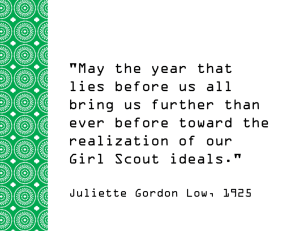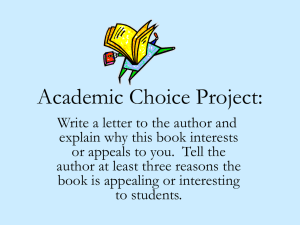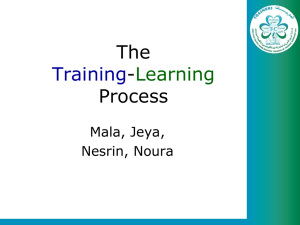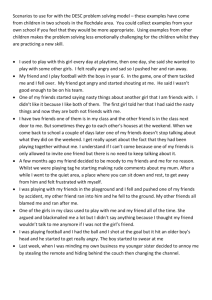General Vision and Viewpoint. Foster by Claire Keegan
advertisement
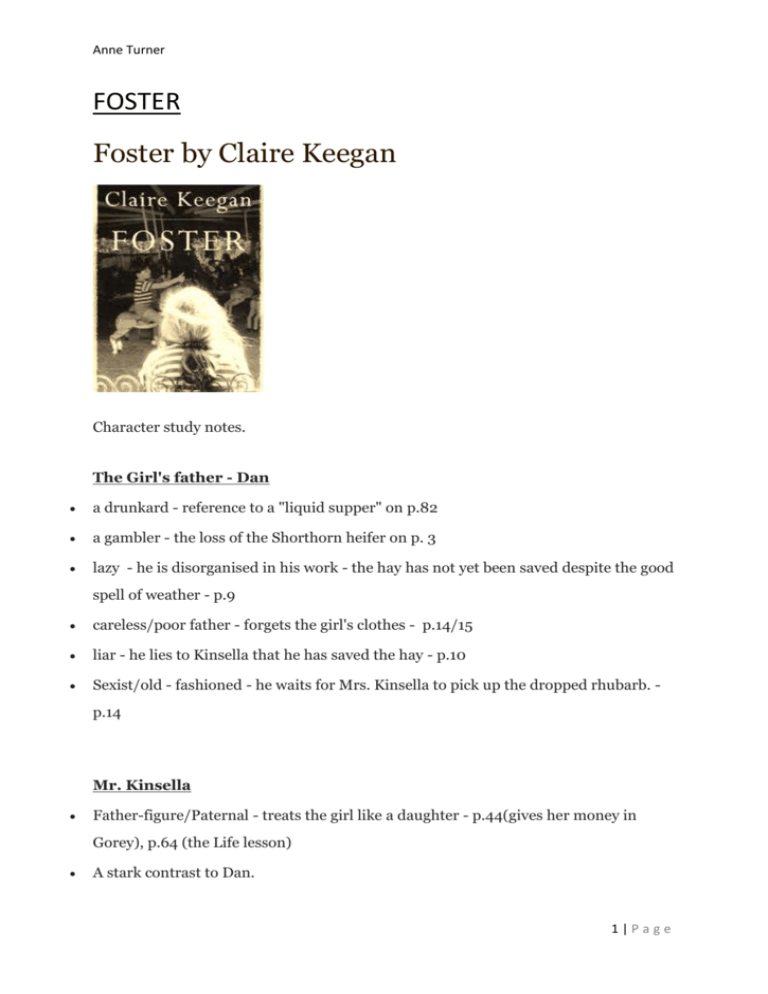
Anne Turner FOSTER Foster by Claire Keegan Character study notes. The Girl's father - Dan a drunkard - reference to a "liquid supper" on p.82 a gambler - the loss of the Shorthorn heifer on p. 3 lazy - he is disorganised in his work - the hay has not yet been saved despite the good spell of weather - p.9 careless/poor father - forgets the girl's clothes - p.14/15 liar - he lies to Kinsella that he has saved the hay - p.10 Sexist/old - fashioned - he waits for Mrs. Kinsella to pick up the dropped rhubarb. p.14 Mr. Kinsella Father-figure/Paternal - treats the girl like a daughter - p.44(gives her money in Gorey), p.64 (the Life lesson) A stark contrast to Dan. 1|Page Anne Turner He makes excuses not to work on her final day, so he can spend time with her. Protective - he takes her away from Mildred, the gossiping neighbour. p.59 Emotional - he cries in the final page, during the walk... finds support in the girl's company - footprints in the sand - p.66 “‘Ah, the women are nearly always right, all the same,' he says. 'Do you know what the women have a gift for?' 'What?' 'Eventualities. A good wan can look far down the line and smell what's coming before a man even gets a sniff of it.' " For the only time in her life, for one brief, fleeting moment, Leanbh is an only child, looked after and cared for as if she were a gem more precious than money: "There's a big moon shining on the yard, chalking our way onto the lane and along the road. Kinsella takes my hand in his. As soon as he takes it, I realise my father has never once held my hand, and some part of me wants Kinsella to let me go so I won't have to feel this. It's a hard feeling but as we walk along I begin to settle and let the difference between my life at home and the one I have here be. He takes small steps so we can walk in time. I think about the woman in the cottage, of how she walked and spoke, and conclude that there are huge differences between people." She is fostered to the childless couple while her own mother nears the delivery of another in a long line of children. She is not told for how long she will stay here. In a few short months, this charming, precocious, needy child is exposed to a life far different from what she has had at home. Brilliantly, though, Keegan does not always clearly tell what is different; her subtle suggestions are, perhaps, even more potent. The Kinsella home is supposed to be one where "Petal" is assured that there are no secrets, but she does, in a most 2|Page Anne Turner realistic manner, eventually learn that there is one. By summer's end, her mother's letter arrives, and she is driven home. The most emotional moment for me was a scene at the beach where the girl was taken by her foster father. On the way back he is trying to retrace his steps but he can’t find his own footprints, only the girl’s. So he says “You must have carried me there.” “Many's the man lost much just because he missed a perfect opportunity to say nothing.” Question and answers with quotes WITH CLARE KEEGAN Why does the book end with “‘Daddy,’ I keep calling him, keep warning him. ‘Daddy.” I think that maybe I should have ended the book with “Daddy, I warn him. I call him Daddy". I would hope that this by this stage you would believe that she would love to have Kinsella as her father, because she has a father who doesn’t really care for her; he’s an alcoholic, he’s not just a good or loving father so it’s kind of a difficult place to be. Kinsella is very fond of her, and she’s very fond of him, and I think he’s a decent man, and he has no children of his own anymore, so for me when she sees her Daddy coming, it’s very natural for her to say ‘Daddy’ but because she’s in Kinsella’s arms she’s actually saying it to him. So even though she’s warning Kinsella that her father is coming to get her, what she’s doing in that moment is she’s calling Kinsella ‘Daddy’ which is something she’s wanted to do and couldn’t do until this moment and she didn’t plan it, and the moment enabled her to say something that she wanted to say even though she didn’t intend it. Why does she just call the woman ‘woman’? I think that where I came from is a very odd place! And I don’t think that’s any exaggeration! We’re all a bit strange about names and a name can first of all give you a huge amount of information about a family, if you know a surname. Whose son you are, whose daughter you are. 3|Page Anne Turner The second thing about a name is that it really can be affectionate to call someone by their name and I remember when I went to New Orleans to go to university when I was 17 people introducing themselves to me and to other people and I found it very strange to have my name said and my hand shaken. It just seemed like a huge and adult formality. Adults would have names for each other which had degrees of distance and affection. Children if they were not given a name to address someone by or us - if you were brought into the House and you were the girl and I was Mrs Kinsella, if I did not say to you ‘Call me Edna or Auntie Edna or Mrs Kinsella’ - you would not know what to call me. So you couldn’t call me anything. It was a way of keeping you at arm’s length, by not telling you what you can call me or how you can address me. I think one of the things that Mrs Kinsella did was she did not want to get too fond of the girl; I think she had a fear of getting too fond of a child who she knew she would have to lose at the end of the summer. And so one of the ways she handled this - and I think handled it well - was to give her no name to address her by. It’s again the power of naming or not giving someone a name. Also it’s a story about when you’re a child you really don’t know what’s going on a lot of the time and when you’re in a strange place with people you’ve never met before or have no memory of ever having met, you’re landed in deep water and you’re not quite sure how to carry on and with this situation I think that not being told what to call her was part of the portrait of not knowing what was going on. Did you ever think about continuing the story or did you want to leave it as just a bit ambiguous? I don’t feel it is ambiguous. I felt the story was finished, and I feel that every single story is completed by its reader, not by its writer. That’s the way I like to read. And everything I had to say about the circumstances of these people I said in the number of pages I had. I also think that every story is incomplete. Most of the work in a piece of fiction is done by the reader, not the writer. It’s what the writer stokes up in the reader. Each reader’s private life, secret life, comes out. Imagination is stoked by the text. No two people will ever read the same book. At the end why is Mrs Kinsella crying? “As though she is she crying not for one now, but for two?” Well, you have the right answer! Whatever you think. But for me there is a child who almost drowned and the weight of the bucket of water nearly killed her, and I think that Mrs Kinsella up until the point she left her home was 4|Page Anne Turner suffering imagined loss of the girl on top of the loss of her own son and it was only after she left her back to the relative physical safety of her home that she felt the relief and could cry. We often cry out of relief. For me, that is what she was suffering from or experiencing at that moment. But she could have been driving up that lane to tell those people that your daughter has drowned. I think that she was living with that. Mrs Kinsella is quite realistic about the girl: she knew that she would go back to her family. Perhaps Kinsella hoped she mightn’t in a stronger way or a less realistic way. Mrs Kinsella didn’t let herself get as fond of this child as her husband did. Why did you write from the girls’ perspective and in the present tense? Well, it’s her story, and she’s the bridge between the two houses. I told it in the present tense because again I wanted it to be a portrait of a piece of time, and she didn’t know when this would end or how it would end and so I wanted her to go from day to day with the feeling of real uncertainty and I think that if I’d written it in the past tense, that would have taken some of that away. It would have already happened rather than being something that was happening. What inspired it? Nobody knows where fiction comes from. We don’t know how our minds work. I don’t know where what I write comes from. I did have a picture in my mind for a long time, and that was an image of a hand over still water and the reflection on the surface of that water, and I wanted to explore where that came from. And I came up with this girl. Is it a happy ending or a sad ending? That’s up to you. It’s not a way I look at life; I think it’s a strange way to measure something. I don’t try to be happy. I think that’s a way to be miserable! Whereas I think that if something feels good in the long-term it’s because you’ve learned something. And so if you could gauge the piece of time she goes through in this book as a piece of time when she learns a lot … I would say that that is a kind of happiness. And I would say she developed hugely over the summer, and actually came of age because she was minded. Nothing flourishes so much as that which is neglected, and is then minded. You grow really well when you are minded. I don’t mind if you think it’s happy or unhappy: what I would like you to think is that it was inevitable. Good stories for me end inevitably: after they finish you feel there’s only one thing that 5|Page Anne Turner could have happened, and that is the thing that happened. And I think it’s inevitable that she would return home, and that the Kinsellas would go back to the house with no child. What did you pick a girl as the main character rather than a boy? I think a boy would be less likely to be taken away from the original home, and left out there for the summer. I think he would be kept closer to the family, especially if he was an only son. They say that there are very few good Irish men in literature, good Irish fathers. So many of the fathers in our literature are just awful and neglectful, especially when it comes to fathering a girl and one on the things I probably wanted to do is have a good Irish father in this story. I wanted him also to use his humour and his intelligence and energy with a girl, rather than fostering someone who is male. I don’t think Kinsella was good to her because she was a girl. I just thought he was a decent man who enjoyed her company. So for me it was an opportunity to explore how that would work. I think also because he himself had lost a son, I wouldn’t have wanted another boy to come in: that might have been too symmetrical, too obviously a replacement for the child he had lost. There’s mention of a lost heifer. What’s the significance of this? I don’t know. I just liked the cow so I put it in! Have you ever seen a lost heifer? No? Okay? First of all, heifers are herd animals. They don’t like being alone. She’s not going to be happy. If you saw a lost heifer on a country road, she’s probably be going to be panicking and they’re so big and powerful, and they’re not like a horse who will run swiftly pass you - they’ll panic and go through you. There’s a wonderful quotation by Flannery O’Connor, who said the art of writing fiction is the art of creating pictures. We enjoy fiction when we put the pictures together and they seem to come from the same place, to belong together. It is kind of a dramatic moment to see an animal like that, a great big beast who’s alone. And I suppose you could say the whole story is about families, and about belonging and the heifer is alone and isolated. A long answer for a short question. But I like cows! Where does the cover picture come from? It’s a picture taken in the Luxembourg Gardens in Paris of a carousel there and it was taken by John McGahern’s wife Madeleine. She gave it to me as a present. I just thought, there’s the cover. How easy was it to write from a child’s point of view? 6|Page Anne Turner I minded children for years, and I got on really well with children - that sense of wonder and that sense of freshness. I think because everyone’s been a child then they think they can easily write about being a child and I do think that isn’t true. I enjoyed that part of it - seeing how different knowledge is in a different way of looking at the world. FOSTER General Vision and Viewpoint. General Vision and Viewpoint. Foster by Claire Keegan . Definition. This refers to the author's outlook on life. Their viewpoint influences our perspective of the text and its setting. The vision of an author can be conveyed through the manner in which the plot opens, develops and ends, through key characters and relationships, through the type of society in which the text is located and also through language and imagery. Often the dominant viewpoint of a text can be reflected in a key moment. The Society. * This novel is set in 1981, in Ireland in rural Wexford. * The people living in Ireland at this time were hard workers who had a desire to constantly work. *Although the characters in this novel were aware of what events went on around them, such as the IRA hunger strike and the poverty in Africa, these events seem to have not had any effect on their own world. They lived in extension to their own area. * There is a real sense of pity felt for the young girl at the opening of the novel, she seems lost in her own mind and somewhat isolated as she is driven by her father to a stranger's household with only the clothes she is wearing. * The Kinsellas are portrayed as kind and caring characters and we get a positive vibe from them. * While Dan's character is portrayed as a shady, lazy and rude man. The Climax - Chapter 5. The trip to Gorey. The wake. * As the child is walking down the road to the widow's house for the wake she tastes: "something darker in the air, of something that might come and fall and change things", she has an expectation of the good turning bad. * Mr Kinsella is very affection towards the young girl and as she sits on his lap she is at complete ease sipping on lemonade and eating a queen cake. 7|Page Anne Turner * We are introduced to the noisy Mildred who constantly asks the young girl all sort of questions about the Kinsellas. Her choice to tell the tragedy that killed the Kinsella's son is very unsympathetic and portrays her as a negative character. * There's unexplained tension between the Kinsellas, When John suggests that the little girl gets "togged out". This somehow upsets Edna and we feel compassionate towards her. * The young girl's response when Mr Kinsella gives her the £1 note is quite unusual, she "stares" at the money as if she had never been given her own money before and she couldn't believe it. We feel saddened and pitiful by this as the protagonist never got to experience how it feels to have her own possession of money or any valuable. * When Edna and the little girl are shopping the young girl is mistaken as Edna's daughter and in this, Edna doesn't once deny it or correct it. she simply embraces the opportunity to believe the young girl is really own even just for a few minutes. * The opening chapter of this novel is quite pessimistic. * Immediately there's pity and sympathy felt for the young girl and her life. * We sympathize with how she is not cared for properly by her parents and how they allowed her to go to mass on Sunday dressed in dirty clothes. * There is pity felt for her when she remembers the conversation her parents had before about when she should return home and the way neither seemed to really care about their daughter. * There is a passionless and aloof relationship between Dan and his daughter. Chapter 1. Thank you The walk. * It is now obvious that the little girl has grown closer to Mr Kinsella and they have developed a deep and affectionate relationship. * While walking to the sea, as Dan holds her hands she suddenly realizes that her father had never once held her hand and we feel sorry for her in this part as she has been deprived of true fatherly love and affection. * A full outlook of John is now revealed as his wonderful qualities of caring, loving, generosity, affectionate, kind and also a good husband and father is seen and we admire these qualities in his character. Chapter 8 * As the holidays come to an end it is soon realized by the little girl and the Kinsellas that she can't live with them forever. This is heart-breaking as we know that they do not want to part and there is mutual love between the three of them. * We also for the first time are introduced to Mary and her husband's home. It is strange when we see the contrasting lives of the families as one struggles and is overcrowded the other is content but childless. This makes us realize the unfairness of life. * As this novel comes to an end the little girl has now developed as a person and soon realizes what she wants and where she wants 8|Page Anne Turner to be. * She has now experienced what it feels like to be truly valued and in this we are happy for her. * We are extremely saddened when the young girl has to part with the Kinsellas. The reference to how Edna is " sobbing and crying, as though not for one now, but for two" is as despairing as it is mournful as she has now lost two children. * The most emotional and heart-breaking moment of this novel is when the young girl runs to John Kinsella and hugs him. We are full of sorrow as we wish there was a happy ending. . Final outlook on the novel. Overall, the novel provoked truly upsetting feelings in the reader. There is sympathy felt throughout this novel for most of the characters, but definitely for the young girl. As readers we empathize the many feelings the girl felt from sadness and pain to the optimism and happiness she endured. We travelled through the emotional journey the girl had with her. As readers we are not satisfied with how the novel ends but perhaps this realistic ending was the author's way of showing us that life does not always have a happy ending. Uncertainty. * At the opening of the novel, there were many references made between the adults to "twelve months' time" but throughout the novel we never found out what was meant by this. * The name and age of the narrator and protagonist of the novel was never once mentioned. * What happens in the end between Mr. Kinsella and Dan after the closing chapter? * We are unsure of the ending, does the young girl return to the Kinsellas? We are also worried for her safety. Questions are asked of what will happen next! 9|Page


